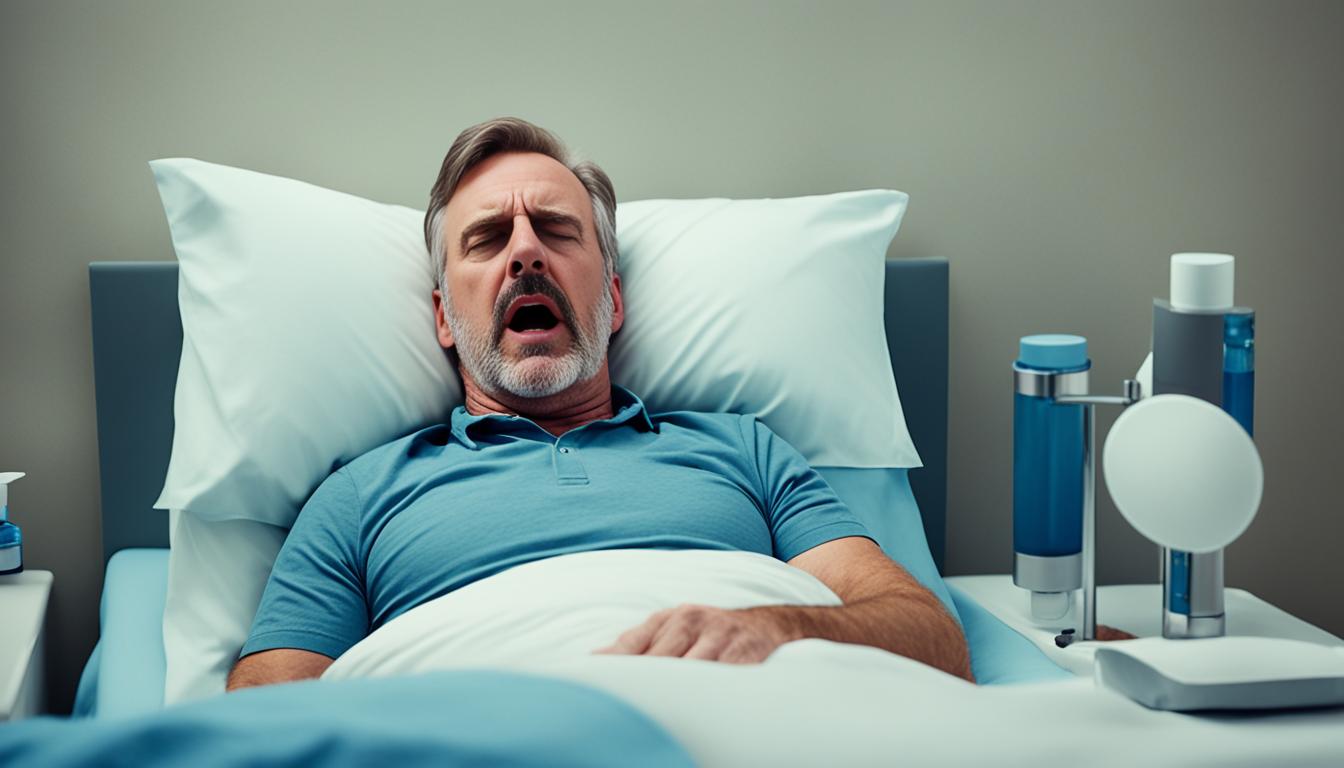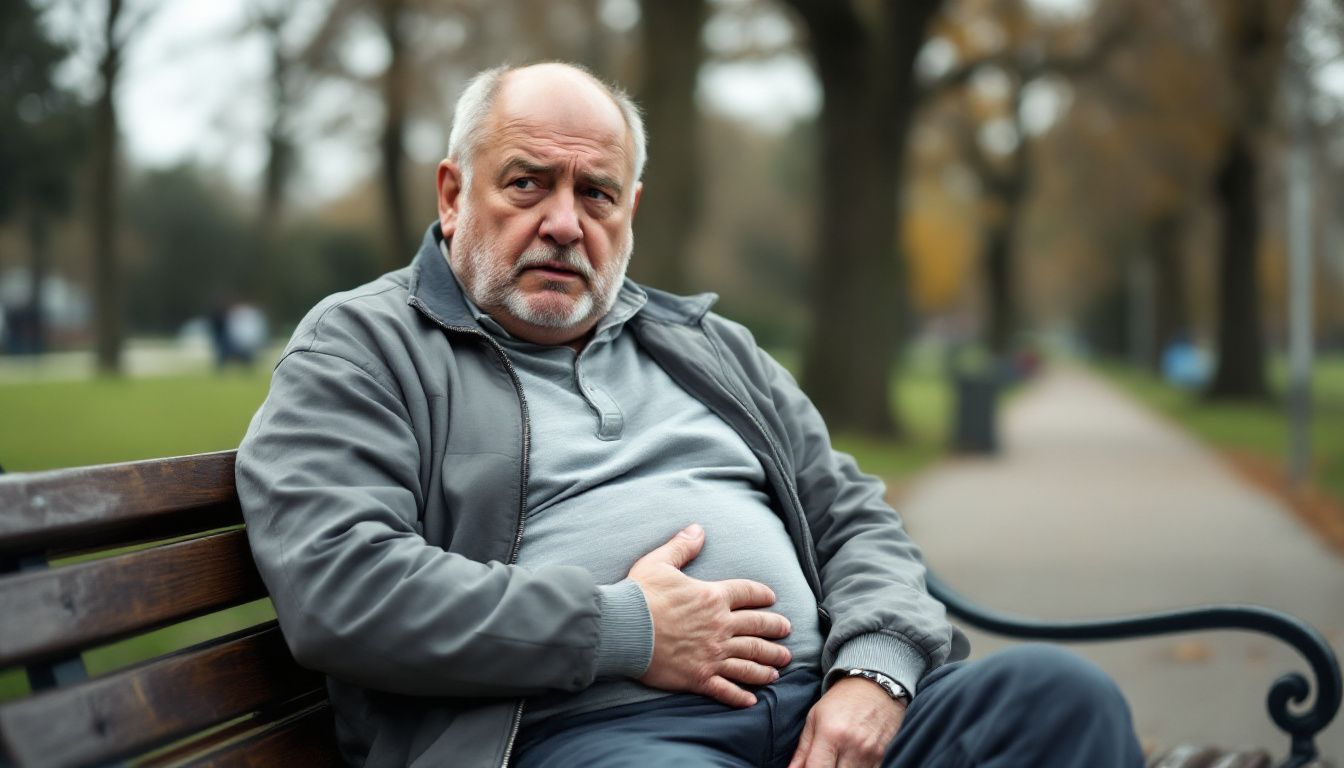An enlarged prostate is also called benign prostatic hyperplasia (BPH). It’s common in aging men. Frequent nighttime urination, known as nocturia, is a notable symptom of BPH. We’ll look into how an enlarged prostate causes nocturia and how it affects daily life.
Key Takeaways:
- Enlarged prostate, or BPH, is a common condition that affects men as they age
- Nocturia, or frequent urination at night, is a major symptom of an enlarged prostate
- An enlarged prostate can interfere with normal urinary function and cause nocturia
- Nocturia can disrupt sleep and have negative effects on overall health and well-being
- Treatment options are available to manage an enlarged prostate and reduce nocturia symptoms
How Enlarged Prostate Causes Nocturia
An enlarged prostate and nocturia have a direct link. The prostate is a gland under the bladder. It can grow larger as men get older. This condition is called benign prostatic hyperplasia (BPH). It can block urine flow.
Men with an enlarged prostate may find it hard to start peeing. They could have a weak stream or need to go a lot at night. Nocturia means waking up often at night to urinate. It can hurt a person’s sleep quality.
“Nocturia occurs when the need to urinate at night interrupts sleep, causing frequent trips to the bathroom.”
Let’s look closer at why an enlarged prostate causes nocturia. Think of the prostate as a roadblock for urine flow. When it gets bigger, it can block the urethra. This causes a need to pee often, leading to sleep loss.
If you’re going to the bathroom a lot at night, see a doctor. They can check if you have nocturia from an enlarged prostate. They’ll suggest treatments that can really help.
Factors Contributing to Nocturia in Enlarged Prostate
Nocturia from an enlarged prostate has several causes. These include:
- The physical obstruction of the urethra due to prostate enlargement
- An overactive bladder that results from the increased effort required to urinate
- Changes in urinary patterns due to hormonal imbalances
- Inflammation or infection in the urinary tract
Knowing these factors helps doctors create better treatment plans for nocturia.
Exploring Natural Remedies for Enlarged Prostate and Nocturia
There are natural ways to ease symptoms of an enlarged prostate and nocturia. These methods include:
- Eating a balanced diet filled with fruits, veggies, and whole grains
- Limiting caffeine and alcohol
- Doing pelvic floor exercises like Kegels
- Using relaxation techniques to lower stress
- Trying herbal supplements, like saw palmetto, with a doctor’s okay
While these remedies can help, it’s vital to talk with a healthcare provider for the right advice.
The Importance of Seeking Medical Advice
If you have signs of an enlarged prostate or nocturia, see a healthcare pro. They can give you a clear diagnosis and suggest treatments. Their advice can improve your symptoms and life quality.
Understanding the Link Between Enlarged Prostate and Nocturia
In conclusion, an enlarged prostate can lead to nocturia. This happens because the growing prostate blocks urine flow. Nocturia can disrupt sleep and affect well-being. Although natural options can help, seek medical advice for the best care.
The Effects of Nocturia on Health
Nocturia can do more than just interrupt sleep; it affects a man’s health deeply. It makes the bladder work extra hard to push urine out. Over time, this heavy workload can weaken bladder muscles, leading to problems seen with an enlarged prostate such as feeling a strong urgency, a weak urine stream, and not emptying the bladder fully.
Men with an enlarged prostate face a higher chance of getting urinary tract infections (UTIs). This happens because leftover urine is a perfect place for bacteria to grow, causing infections. UTIs bring discomfort and might need medical help to heal. If you pee often, watch out for signs of infection. These signs include pain when peeing, cloudy or bloody urine, or really needing to go often.
Not emptying the bladder fully also means minerals in the urine can form stones in the bladder or kidney. These stones can hurt, cause infections, and even make you find blood in your pee. Not dealing with kidney stones can cause bigger problems, like damaging the kidneys.

Managing nocturia well is key to a man’s quality of life. By tackling the reasons behind frequent pee breaks, like making changes in your life and getting the right medical help, you can help your bladder work better. This reduces the chances of facing further health issues, leading to a better wellness overall.
Managing Enlarged Prostate Symptoms
When you have an enlarged prostate, you can face discomfort and frequent night urination. There are various treatments to ease these symptoms. The right one depends on how severe your condition is.
1. Lifestyle Modifications:
Mild to moderate symptoms may improve with simple lifestyle changes. These can make a big difference. Here are a few changes to consider:
- Adjusting your diet: reduce fluid intake before bedtime, avoid caffeine and alcohol, and limit spicy or acidic foods that irritate the bladder.
- Engaging in pelvic floor exercises (Kegel exercises): They strengthen bladder support muscles and help with urinary control.
2. Medications:
If symptoms don’t get better, a doctor might suggest medication. Medicines can ease urinary issues from an enlarged prostate. Two main types are:
- Alpha-blockers: They relax your bladder and prostate muscles, helping urine flow better.
- Muscle relaxants: These shrink the prostate and ease symptoms.
3. Surgical Interventions:
“Surgery might be needed for severe BPH to ease symptoms and enhance life quality.”
When other treatments don’t work, surgery may be an option. Surgical treatments aim to shrink or remove prostate tissue. Common procedures include:
- UroLift implants: A less invasive method that opens the urethra by lifting prostate tissue.
- Prostate tissue removal: This surgery removes tissue blocking urine flow.
- Minimally invasive procedures: Techniques like laser therapy or TUMT reduce prostate tissue with heat.
Talking to a healthcare professional is crucial to choose the best treatment. Regular check-ups and the right treatment help manage symptoms. They also ensure better sleep and overall health.

4. Conclusion:
To manage enlarged prostate symptoms like nocturia, combine lifestyle changes with medical treatments. With the right strategies and medical advice, you can find relief. This improves life quality and controls urinary health.
Conclusion
Nocturia often happens with an enlarged prostate, also known as benign prostatic hyperplasia (BPH). It’s important to know both the causes and effects of nocturia. This knowledge helps in managing symptoms better. You can make lifestyle changes, like eating better and doing pelvic exercises. Medical treatments and surgeries can also help.
Are you going to the bathroom a lot at night? If yes, talk to a doctor about your symptoms. They can tell you what’s wrong and how to treat it. Every person is different, so care must be personalized. Tackling the root cause of nocturia helps you feel better and be more active.
Nocturia and an enlarged prostate shouldn’t mess with your sleep or life. You can control symptoms with the right approach. Start by talking to a healthcare provider about treatment choices. Your health is important. So, take steps to improve your nights and days.
FAQ
Why does an enlarged prostate cause frequent urination at night?
If you have an enlarged prostate, it may press on the urethra and make peeing hard. This can lead to trouble starting to pee, a weak stream, and the need to pee a lot at night.
What are the symptoms of an enlarged prostate?
Having an enlarged prostate might make starting to pee difficult. You might have a weak stream, need to pee often, feel urgent need, struggle to empty your bladder, or leak urine.
How is an enlarged prostate treated?
There are several ways to treat an enlarged prostate. These include changing your lifestyle, taking medication, and possibly undergoing surgery. Options like UroLift implants or less invasive surgeries are available too.
Can natural remedies help with an enlarged prostate?
Natural remedies might offer some relief, although the proof is scarce. Herbs like saw palmetto and stinging nettle root are popular choices. But always talk to a doctor before trying them.
What causes frequent urination at night?
Nocturia, or peeing a lot at night, can happen for many reasons. An enlarged prostate, infections, drinking lots of fluids, some meds, diabetes, heart issues, and sleep problems can all cause it.
What lifestyle changes can help manage the symptoms of an enlarged prostate?
To manage symptoms, try drinking less before bed and avoid bladder irritants like caffeine. Staying fit, exercising, and doing pelvic exercises can help too.
Can an enlarged prostate lead to other health complications?
Yes, it can lead to more serious issues. Constant peeing at night can harm the bladder, up the chance of infections, and lead to bladder or kidney stones. These can harm the kidneys if ignored.
How can I improve my quality of life with an enlarged prostate?
Managing your symptoms well can improve life with an enlarged prostate. See a doctor for advice and treatment plans. Tackling nocturia’s cause can make a big difference in how you feel.



